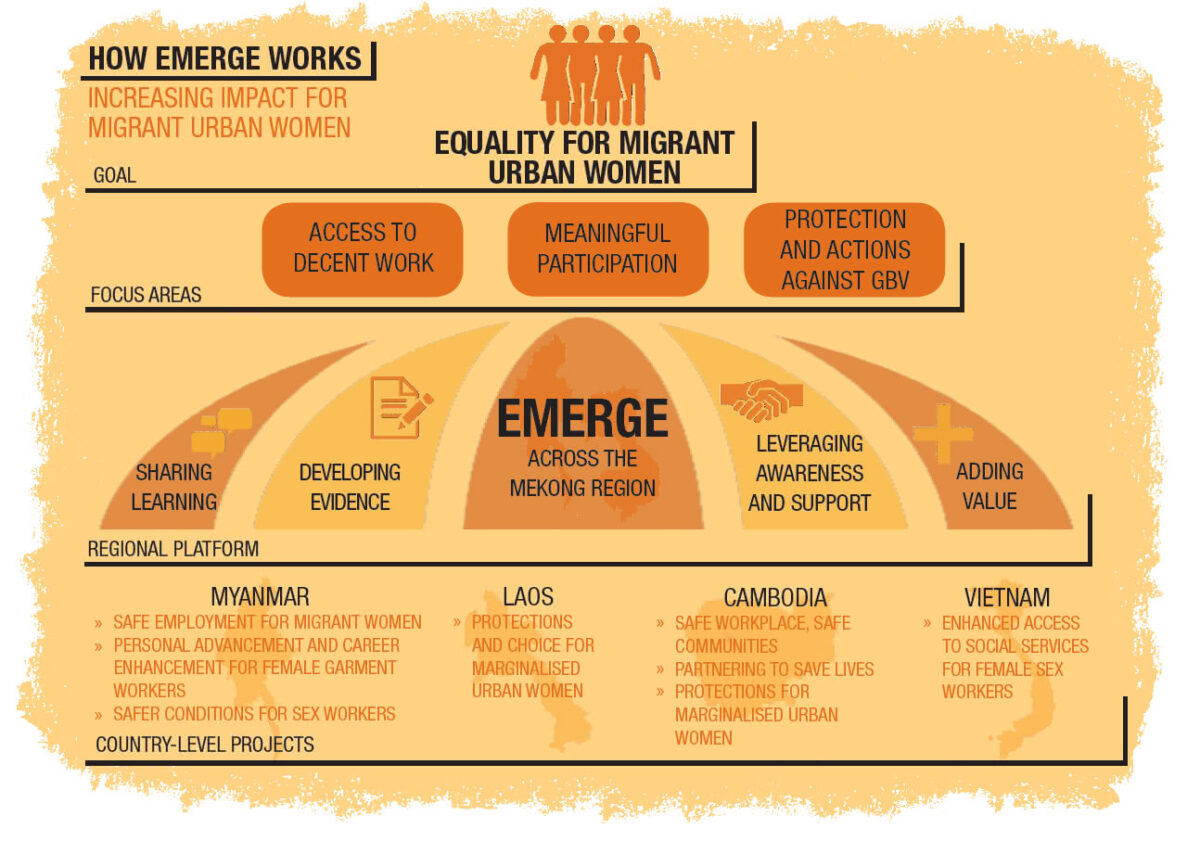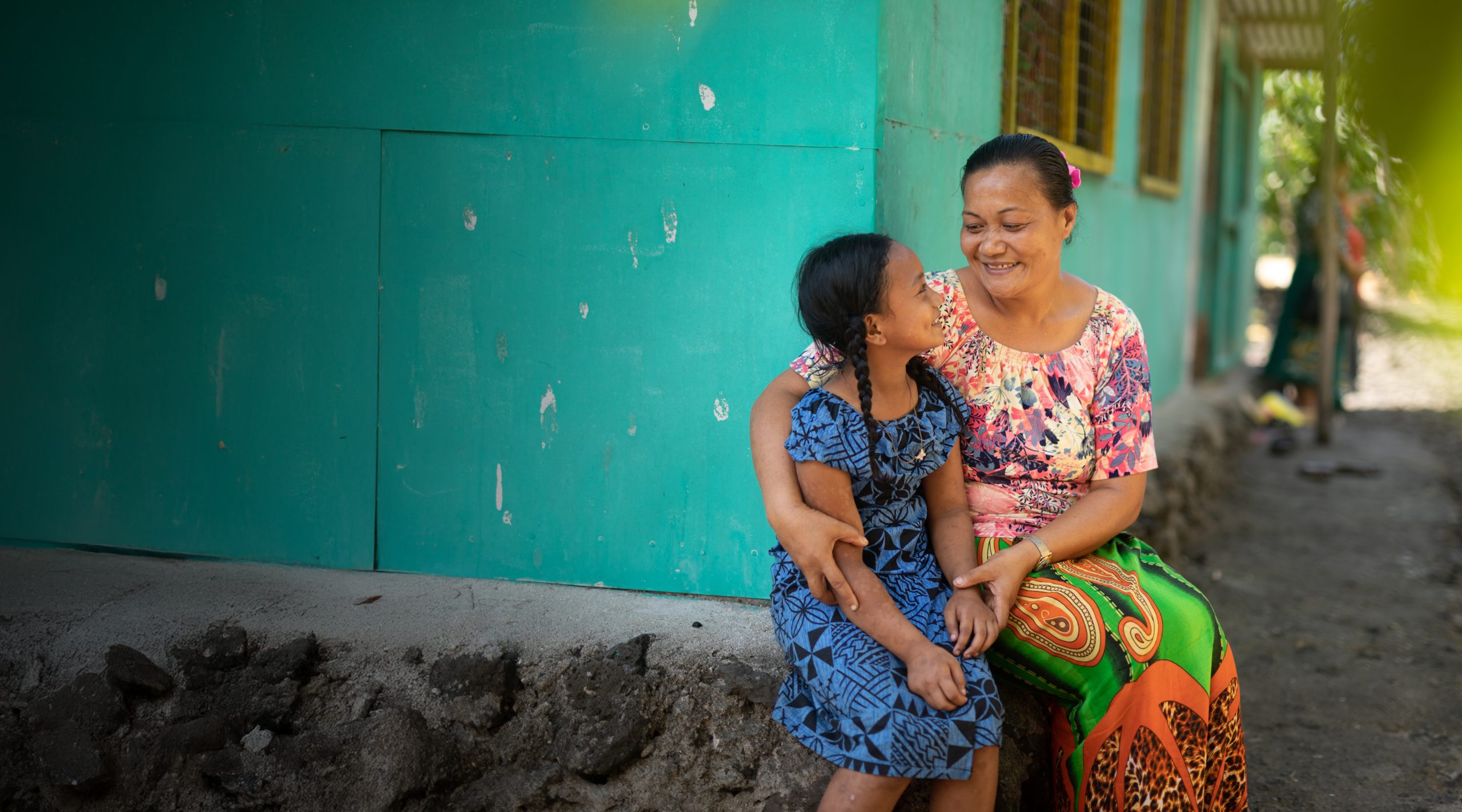EMERGE supports the empowerment of women across the Mekong region to safely learn, work, engage in their communities, and have a voice.
EMERGE is a four-year regional initiative implemented by CARE and funded through the Australian NGO Cooperation Program (ANCP), which is part of the Australian Department of Foreign Affairs and Trade.
Migrant urban women in the Mekong region have moved from their homes to rapidly developing urban areas, in search of work. Their migrant status, lack of income and the absence of social support renders them vulnerable; they become socially, politically or economically marginalised, and are thus excluded from making decisions on matters that affect them.
Migrant Urban Women
Migrant urban women are often an invisible population, unknown to the communities they live within and to the authorities. This lack of visibility, coupled with low social status and exclusion, leads to high levels of vulnerability to violence
and exploitation.
In order to support themselves and family back home, many migrant women find work as entertainment or hospitality workers, as domestic workers, at garment factories, or by selling sex. These working conditions lead to further difficulties and risks, which are specific to each sub-impact group:
Female Garment/Factory Workers (FGFW)
FGFW are subject to long hours in unhealthy conditions, low pay and regularly experience violence and sexual harassment at work. Employers actively exclude them from political participation and decision-making.
Female Entertainment and Hospitality Workers (FEHW)
FEHW regularly experience sexual harassment at work and often this is viewed by employers and patrons as ‘part of the job’. There is little awareness of, or access to legal protection.
Female Domestic Workers (FDW)
FDW are a largely hidden population, thus little evidence has been gathered about the specific issues they face. However, it is noted that their invisibility renders them vulnerable to exploitation and gender-based violence and they lack access to vital support services.
Female Sex Workers (FSW)
FSW are vulnerable to violence, economic instability and health risks. Social stigma and discriminatory legal systems leads to exclusion from health and legal services, as well as more informal forms of support, such as from family or the community.

What does EMERGE do?
EMERGE is a supporting and connecting mechanism for CARE programs and their partners, who are working to empower migrant and marginalised urban women in the Mekong region. EMERGE aims to scale up the impact of CARE programs addressing access to decent work, meaningful participation, and protection and actions against GBV, through the sharing of expertise and evidence-based research.
Adds value to country programs
EMERGE provides technical support to CARE Country Offices, including reviewing tools, reports, evaluations and assessments, in order to enhance the capacity of migrant urban women programs to make progress in access to decent work, meaningful participation, and protection and actions against GBV.
Shares learning, tools and best practices
EMERGE shares best practices, innovations, tools and resources between projects, country offices, local partners, and other stakeholders, such as governments and local and international NGOs. This enables CARE teams and their partners to learn from each other’s efforts, identify methods which may be replicated within their own context, and work more efficiently towards effective outcomes.
Develops evidence for advocacy
EMERGE supports Country Offices to collect high quality data from their projects, in order to identify key issues which affect migrant urban women and consistently strive for greater impact. EMERGE also conducts independent research across the region into the impact of access to decent work, meaningful participation, and protection and actions against GBV on women’s economic participation.
Leverages awareness, action and support
EMERGE connects Country Offices and programs to strategic partners, stakeholders, resources and specialists, improving communications and mutual support. The resulting partnerships enable CARE, partners and stakeholders to scale-up impacts by sharing resources, learning, and expertise. EMERGE research and project impacts are also disseminated to stakeholders, donors and partners to increase awareness of key issues and achievements, generate support for EMERGE programs, and spur action for the equitable participation and representation of migrant urban women.
MYANMAR
Safe Employment for Migrant Women
Many women move to Yangon and Mandalay from rural locations in search of work, and after arriving with little money or social support, become increasingly vulnerable to exploitation and violence.
CARE and local partners are addressing unsafe working environments for female migrant workers by improving access to training, healthcare services and legal services. This is in addition to advocating for stronger and better-implemented legal protections against GBV and labour exploitation. CARE is working at both national and local levels with employers and local authorities.
Personal Advancement and Career Enhancement (P.A.C.E.) for Women Garment Workers
P.A.C.E. is a global program developed by GAP Inc. and non-government organisations to improve the technical and life skills of women garment workers. Through this project, CARE Myanmar promotes personal and career development for women garment workers in Yangon, and for other women in surrounding communities. This is done by delivering practical training, engaging employers and local communities in supporting the development of women garment workers.
Safer Conditions for Sex Workers
Sex workers suffer stigma, discrimination and violence, which results in their marginalisation within society and exclusion from a wide range of social services. CARE is working with local partners to improve the health and well-being of female sex workers in Yangon and Mandalay, by promoting their representation in the wider society. CARE is also working to reduce the stigma and connecting female sex workers to training, mentorship and other alternative employment opportunities.
LAOS
Protections and choice for Marginalised Urban Women
Marginalised urban women and adolescent girls who work in either the garment factory, domestic, entertainment and hospitality industries often face violence, exploitation and abuse on a regular basis.
CARE is working to alleviate this by strengthening both women’s and authority figures’ legal literacy, knowledge of employment including payment rights and protections. CARE is also improving women’s accessibility to and knowledge of health services, as well as increasing their representation through the development of a stronger
civil society.
CAMBODIA
Protections for Marginalised Urban Women
Despite protections against gender-based violence in the legal and policy framework, a lack of accountability and poor implementation of the law means that GBV and sexual harassment remains a significant risk for women in Cambodia.
This project specifically targets the priority concerns of female garment, entertainment and hospitality workers surrounding access to GBV and sexual harassment protections. This is achieved by mobilising authorities to realise, acknowledge and implement their responsibilities.
Partnering to Save Lives
Neonatal mortality rates in Cambodia still account for 50% of all deaths of children under five years of age. The Partnering to Save Lives project (PSL) aims to save the lives of women and newborns in Cambodia through improved quality, access and utilisation of reproductive, maternal and neonatal health services.
This is achieved by partnering with frontline health service providers and working directly with some of the hardest to reach and most vulnerable communities.
Safe Workplaces, Safe Communities
In Cambodia, violence against women is commonplace. This project aims to reduce the risk of GBV and sexual harassment for women in Cambodia by providing training and education on life skills, health and gender issues. This is applicable for students and workers in the garment, hospitality and tourism industries.Training on women’s rights and the law is also provided to police officers, employers and government officials.
The general public, civil society, the government and the private sector are also motivated to take action against GBV and sexual harassment through media campaigns, awareness, behavioural change initiatives, capacity building, networking and advocacy.
VIETNAM
Enhanced Access to Social Services for Female Sex Workers
Female sex workers in Vietnam experience a denial of multiple rights, live and work in unsafe environments, and are socially marginalised. They risk exploitation, abuse and violence; lack access to basic services, social and legal protections’ and lack visibility
in society.
This pilot project aims to empower female sex workers in Vietnam to influence policies and decisions that affect their lives and to have equitable opportunities and access to services.
One of the main ways CARE will achieve this is by working with the government to protect female sex workers and give them equal rights.This is by the delivery of programs in addition to the development and implementation of policies.


